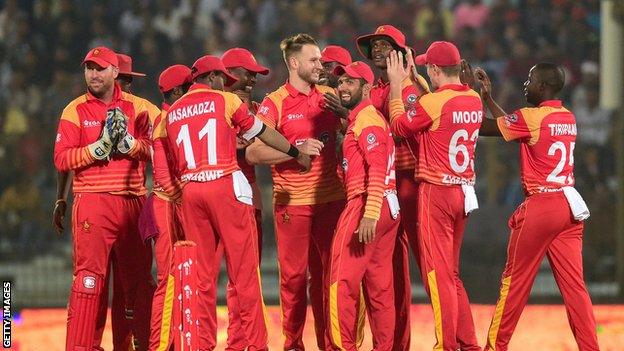ICC suspend Zimbabwe Cricket for political interference
- Published

The ICC says Zimbabwe Cricket failed to fulfil "their obligation to provide a process for free and democratic elections."
The International Cricket Council (ICC) has suspended Zimbabwe for failing to ensure there is no government interference in its running of the sport.
ICC funding has been withdrawn and the country will be barred from participating at ICC events.
Zimbabwe are due to take part in a T20 World Cup qualifier in October.
"We must keep our sport free from political interference," said ICC chairman Shashank Manohar.
"What has happened in Zimbabwe is a serious breach of the ICC constitution and we cannot allow it to continue unchecked."
The ICC issued the punishment after the entire Zimbabwe Cricket Board was suspended by the government sports and recreation commission last month and replaced with an interim committee.
The ICC says it will review its decision at a board meeting in October.
Zimbabwe's Test status was suspended by the ICC in June 2004, external after 15 players dropped out of the squad after the then captain Heath Streak was sacked.
They played eight Test matches in 2005 after the suspension was lifted, but would then not play another Test match until 2011.
They failed to qualify for this year's Cricket World Cup in England and Wales.
In March, former Zimbabwe Cricket director Enock Ikope was given a 10-year ban from the game after being found guilty of breaching three counts of the ICC's anti-corruption code.
His suspension followed a 20-year ban for Rajan Nayer, a former Zimbabwe cricket official, for attempted match-fixing in March 2018.
Meanwhile, the Croatia Cricket Federation and the Zambia Cricket Union have also been suspended for failing to meet ICC criteria while the Moroccan Royal Cricket Federation has been expelled for continuing to remain non-compliant.
The decisions were taken at the ICC annual conference in London.
Concussion replacements approved
The ICC has also approved the use of concussion replacements in all forms of the game following a trial in domestic cricket.
Decisions on replacements will be made by the team's medical representative and the player must be a like-for-like replacement approved by the match referee.
The ruling will come into force from 1 August, meaning the first game for which they will be available will be the first men's Ashes Test at Edgbaston.
In another decision approved by the ICC on Thursday, a captain will no longer be suspended for serious over-rate breaches, with all players taking equal responsibility and being fined the same amount as the captain.
In the World Test Championship, which is due to start next month, a team that is behind the required over-rate at the end of a match will have two points deducted for each over it is behind.